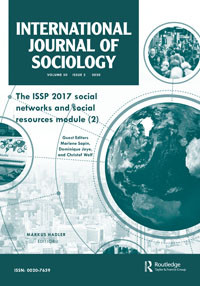
The article "Network capital and migration potential" by Júlia Koltai, Endre Sík and Bori Simonovits has been published by International Journal of Sociology.
The specialty of our paper, based on the Hungarian survey of ISSP 2017 is that (1) we only focus on a single (the planning) phase of the migration process, (2) we use the concept of network capital, which fits the strategic features of the migration potential phenomenon, (3) we estimate the impact of the size of Ego’s network and that of the respondents’ strong and weak ties on the migration potential separately, and (4) within the strong ties we analyze the impact of the migration specific networks and the negative perceptions of strong ties. We found that among the network variables, migration-specific network had far the strongest role in the planning phase of migration. This core group contains strong ties to people with migration experience who very likely themselves accumulated network capital that can transfer to Ego. This core network seems to act as hammer and anvil in forging the chain upon which the entire migration planning process depends in a manner very much like the early sociologists and historians/anthropologists described it. Other elements of Ego’s network (such as the size of the network or weak ties) do not have significant impact in the planning phase of migration.

